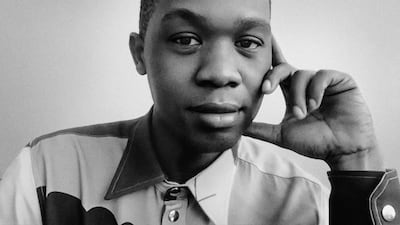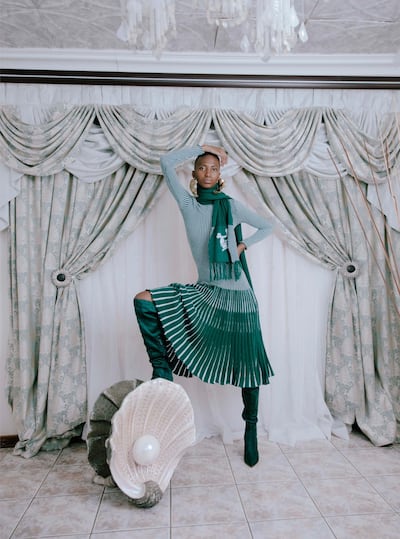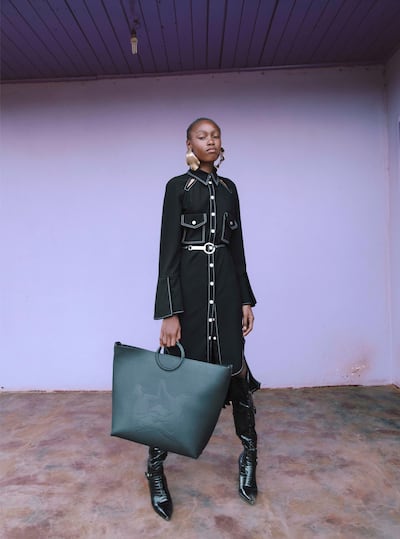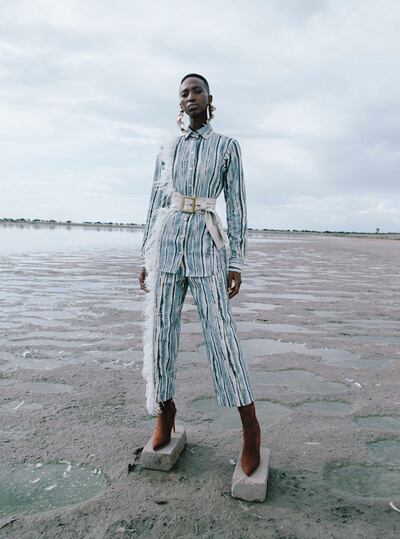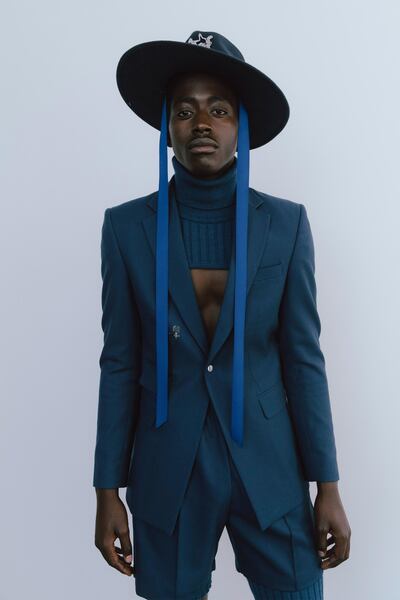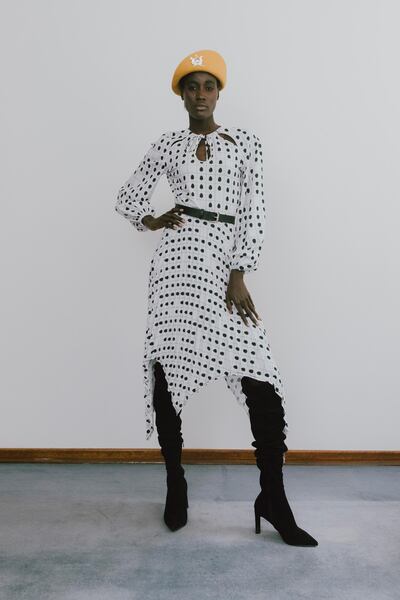Thebe Magugu may not yet be a name that trips off the tongue, but that's about to change. Because Thebe (pronounced "Tebe"; the h is silent) is, by most accounts, a force to be reckoned with.
Hailing from Kimberley in South Africa, a small town more famous for diamonds than fashion, Magugu is in the midst of what can only be described as a stratospheric rise. The creator of quietly beautiful menswear and womenswear, he launched his label in 2016. His work was picked up by Italian Vogue and in 2019, he won the LVMH prize. Presently, he is in the final six for the International Woolmark Prize 2021 (the winner will be announced later this year) and is part of MatchesFashion's Innovators Programme.
“Getting the message from Natalie [Kingham, buying director at MatchesFashion] that she was considering me to be part of the Matches Innovator programme was such an honour,” Magugu tells me.
“Natalie and I go back. She was one of the judges for the International Fashion Showcase in London. She was so interested in what I was doing, so it’s sort of a full circle,” he adds.
It is worth noting that Magugu won the 2019 International Fashion Showcase prize so convincingly that the judges, including Kingham, hailed him as a “leader of his generation”. Now he has been reunited with Kingham for the Innovators Programme, as part of which 12 emerging fashion labels receive backing, support and mentorship from MatchesFashion experts, and are given space on the online platform. Yet, despite so many accolades, Magugu remains disarmingly grounded, and deeply appreciative of the power of learning directly from experts.
"I am based in Johannesburg, so I am quite far from fashion in that sense, so in the past it has been quite a struggle. I went to a fashion school here that was great in terms of creativity, but it didn't really delve into the buying process or other facets of the industry. But the biggest blessing in my life was meeting people along the way who have acted as mentors to me, and taken the time to teach me. I am really grateful for that."
A sense of learning runs through his collections, which, despite at first glance appearing stripped back and simple, are brimming with artful tailoring and sparse patterning that reflect hours of meticulous research on topics that hover on the fringes of society.
“I feel a lot of history runs the risk of being forgotten, because it is in the margins. So I make it a point to try to read as much as possible about obscure South African history that not a lot of people know about. I think people understand the big things that come out of South Africa, such as Nelson Mandela and apartheid, but there are so many footnotes that get forgotten,” he explains.
One such footnote inspired his spring 2020 collection. Entitled Prosopography, it was inspired by the Black Sash movement that was founded in 1955 in protest to apartheid. As well as wearing black sashes, the all-female movement would conduct what they called "hauntings", and would stand in silent vigil against pro-segregation figures. This is echoed in the collection as ghostly images of distorted patterning, running across impeccably cut clothes in vivid red and denim blue.
Magugu even tracked down former members of the movement to record their story. “I tried to reach out to the ones who are still alive today, so essentially I can document what they have done. And I love doing that, because, as much as it is about educating others, it is about educating myself as well.”
For his spring/summer 2021 collection, called Counter Intelligence, he looked to the South African female spies who had worked on both sides of the apartheid regime. Again, he sought out the characters involved, using those interviews as the basis for his entire collection. Filled with subtle blink-and-you’ll-miss-it details, there is a small zig-zag pattern based on a polygraph test, a shirt covered in written testament, and even a polka dot that turns out, on closer inspection, to be a fingerprint. The men’s pieces are in muddy olives and teals, and come with discreetly mismatched buttons.
This cerebral approach is what sets Magugu apart and it runs alongside a deeper thread in his work: the idea that one person can make a difference. He himself is committed to empowering and enriching his wider community.
And yet, just like everyone else, he has been impacted by the Covid-19 pandemic, with stores around the world shutting down even as he was shipping his collections to them. “That was a hit, certainly, but I just feel my values have been calibrated even further.
"I think all of us were questioning our contribution to fashion, and certainly in the past, fashion could get away with being fashion for fashion’s sake" he says. " But with the pandemic, we are all starting to think: ‘How has this bettered the community? What value is in this product?’
“I have always been obsessed with the idea of education, because I know what it does for a community. I am from a very small town and I have seen what a lack of education can do to a society. I have seen the effects of poverty and HIV quite close up,” he tells me.
Now in a position to be collaborating with large, established companies, Magugu is using this platform to help uplift others. “There are so many wonderful opportunities that have come my way, but I have to sift through and really veer towards the ones that are in line with what I want to create, while empowering whoever is involved,” he explains.
Case in point, at the start of 2021, Magugu was invited to take part in the Lucky Charms exhibition at Bon Marché in Paris, for which he enlisted regional handworkers. “We sent thousands of embroidered flowers to Paris, done by the women in Ladysmith, which is a very small town.” In December, he teamed up with Adidas in South Africa to create a protective face mask based on a traditional tablecloth print, which was given out for free.
“Masks are not accessible to certain parts of the community in South Africa, so that’s what I mean by purpose-driven projects. Things that contribute over and above the actual product.
“My overall mission is to create a brand that is based in South Africa and very strong here, but with roots all over the world, to show people that it is possible to have localised manufacturing in places that are not known for that. It is quite a mission and very ambitious, but I really feel it can be done.”
